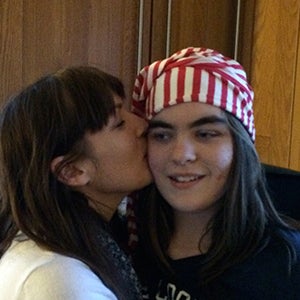Think the disability benefits overhaul is justified? You need to see this video of my daughter being assessed
Emily understands the internet and said, "Tell the people"


My daughter Emily is 18 and learning disabled, with autism and epilepsy.
For those unable to work through no fault of their own, like Emily, there are two benefits specifically in place to ensure that they are able to live. Employment Support Allowance exists purely for those too sick or disabled to work. It's not a perk; it's not an extra. It's a security net when your health is impacted and when your disability prevents you being able to work.
‘Personal Independence Payments’ replaced the more accurately named Disability Living Allowance.
Since both benefits were changed in name, the application claim forms were altered too. There is a points system allocated to all health conditions now.
When I received the forms for Emily, I was staggered by the invasive and intrusive nature of the questions. I was particularly struck by the application of the questions to people like my daughter with a profound learning disability.
The work capability questionnaire as part of Employment Support Allowance runs to 20 pages, and the Personal Independence Payments form to 40 pages.
Emily is disabled for life, yet in order to continue to receive these lifeline benefits she and millions of sick and disabled people will face assessments and reassessments regularly.
This is the system as it exists now. It's not related to recent U-turns on further proposed disability benefit cuts.
So I decided to video Emily while I asked her the questions. Emily was having a very good day and was aware that this was happening. Crucially, as with everything that I put online, I made sure that we gained her permission before posting the film.
Emily understands the internet and said, "Tell the people."
Many leaning disabled people don't have anyone to fight for them, to advocate for them or to intervene. Dependent on the answers given, the benefits are allocated.
As seen in the film, Emily doesn't understand. She answers “Yes” to “Do you have a disability?” but doesn’t know what her disability is called, and answers positively to most questions even though she doesn’t understand the words in them. “Can you cope with small changes to your routine if you know about them in advance?” is met with an immediate “Yes” even though, when I ask Emily if she knows what the word “routine” means, she confesses that she doesn’t. The same happens with questions involving the words “hazard” and “danger”, among others.
I skipped over some distressingly personal questions about bladder and bowel control, as I don’t believe that these should be included on the form in the first place.
Emily faces constant assessments like these for the rest of her life, merely for the privilege of being able to live independently. That’s independently, not lavishly, richly or especially comfortably: merely the bare minimum society owes its most vulnerable.
As one very astute woman commented to me, "These forms are the banality of evil at play."
Join our commenting forum
Join thought-provoking conversations, follow other Independent readers and see their replies
Comments
Bookmark popover
Removed from bookmarks